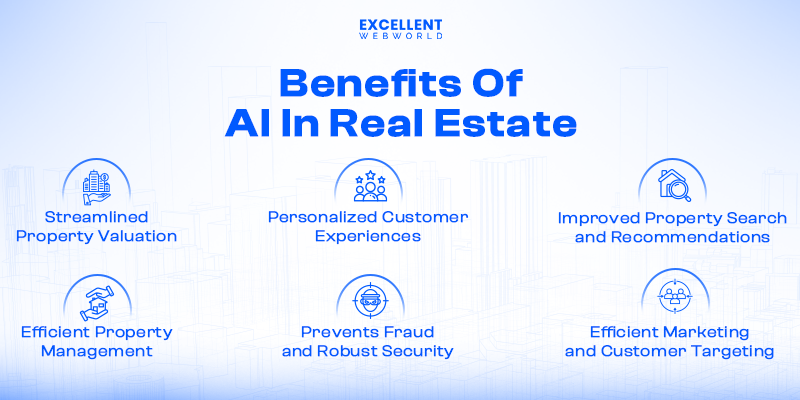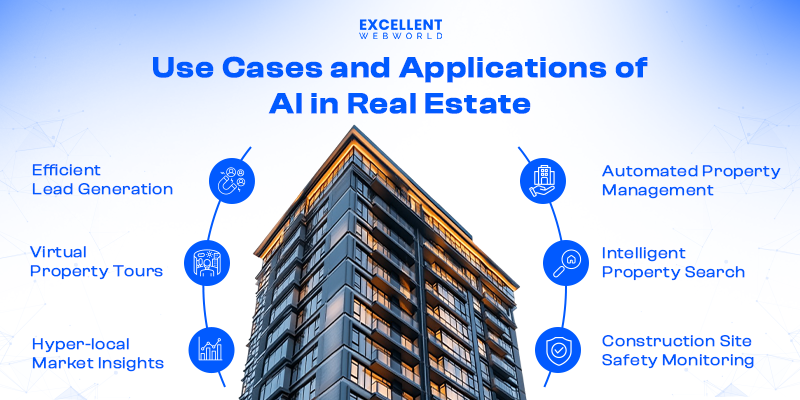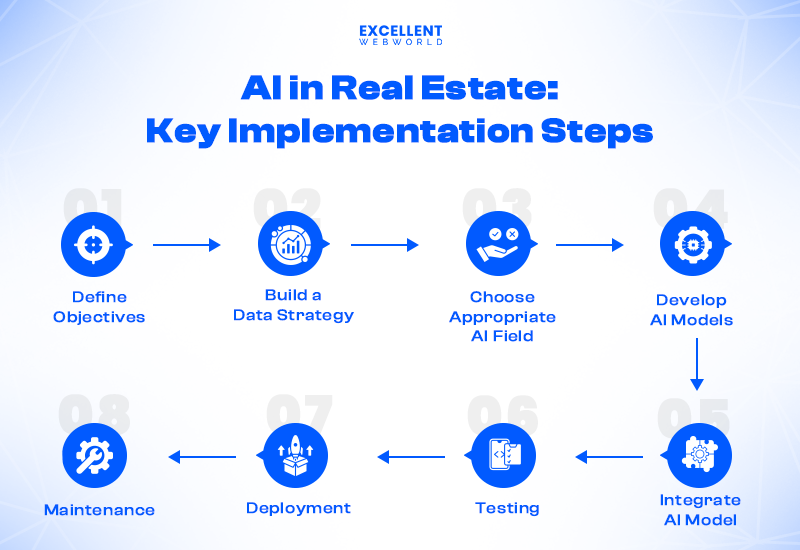What is the most significant challenge you face as a real estate professional? Is it an analysis of massive market data? Or fulfilling customer expectations or relatively accurate decision-making?
Even if you face all these challenges, Artificial Intelligence (AI) can help you overcome them. Integrating AI in real estate services can help you automate data collection, streamline communication, and improve decision-making in the fluctuating market.
Real Estate service providers can use AI to reduce staff workload and improve customer experience. However, there are many other benefits, each depending on a specific use case.
This article explores the benefits of AI in the real estate industry, including use cases. Before you learn about the benefits, here is a basic understanding of how to use AI in real estate.
What is Artificial Intelligence (AI) in Real Estate?
AI in real estate refers to the use of artificial intelligence technologies like machine learning, data analytics, and automation to improve how properties are bought, sold, and managed. It is changing the way real estate professionals work by offering smarter insights and more efficient processes.
From helping you analyze market trends to predicting property values and improving customer communication, AI is becoming a valuable tool for agents, investors, and buyers alike. It can simplify time-consuming tasks, reduce human error, and offer data-driven recommendations that lead to better decisions.
If you’re wondering how AI can actually fit into your real estate business, the good news is there are already many practical applications. Let’s explore some of the top ways AI is being used in the real estate industry today.
How Will AI Be Used in Real Estate?
AI in real estate is used to automate property valuations, offer accurate market predictions, deliver personalized property recommendations, and enhance customer service. It also helps streamline property management, improve lead generation, support predictive maintenance, and assist in risk assessment. By combining these capabilities with insights on property management software cost, real estate professionals can make faster, smarter, and more data-driven decisions.
- Property Valuation: Analyze tons of data to figure out the worth of a property in seconds using AI. It includes location, features, and market trends to provide you with an accurate valuation of the property.
- Market Predictions: AI can analyze past and current data to predict market trends, helping you decide when to buy or sell properties.
- Personalized Recommendations: AI helps in suggesting properties according to user preferences.
- Automation of Tasks: Tasks like scheduling viewings or answering queries can be automated with AI.
- Enhanced Customer Service: AI-powered chatbots can respond instantly to inquiries at any time, significantly improving customer satisfaction.
Current Market Statistics and AI Adoption Trends in Real Estate
AI in real estate transforms the industry by providing innovative solutions that streamline workflows, enhance decision-making, and improve customer experiences. Real estate professionals can gain valuable insights and operate more efficiently by leveraging advanced data analysis and automation.
With AI, tasks like property valuation, market predictions, and customer service are optimized, leading to better business and client outcomes. This is why there is a surge in the adoption of AI in the real estate industry.
Here are some essential insights into the AI-driven real estate market:
Impact of AI on Operations
Cost Savings and Revenue Growth
We will soon see advancements in voice-activated search, neighborhood life quality analysis, data points like sales records, demographic trends, proactive building health monitoring, and AI-driven natural disaster risk assessment.
As the industry embraces AI, it is expected to see further innovations and ideas in real estate businesses operating and delivering value to their clients. But what benefits do you get from investing in real estate with AI? The following section covers the answers you need.
Benefits Of AI In Real Estate
1. Streamlined Property Valuation
Automating the manual process of property valuation based on smart projections is one of the significant benefits of AI.
The traditional way of property valuation was based on manual data analysis. AI changes this process, including historical property data, condition, locality, and connectivity. AI helps you lead the real estate industry by predicting market competitors.
2. Personalized Customer Experiences
AI-driven chatbots and virtual assistants are helpful for your business in interacting with customers in real estate services. These innovative tools engage with clients 24/7, answer queries, provide property details, and even set up viewings. Analyzing individual preferences makes the property search smoother and more enjoyable.
AI in real estate enhances customer experiences by:
3. Improved Property Search and Recommendations
Property search can take much time, but AI makes it much more manageable. Algorithms analyze customers’ needs and preferences and suggest properties.
Integrating AI enhances property searches by:
AI streamlines the property search process, making it quicker and more tailored to each user’s needs.
4. Efficient Property Management
Real estate professionals use advanced AI tools to monitor equipment and systems, which helps them predict maintenance requirements. This reduces repair costs and boosts customer satisfaction. It simplifies tasks like collecting maintenance, automating property inspections, and answering management queries.
AI solutions for property management improve efficiency by:
5. Prevents Fraud and Robust Security
Real estate transactions are large, making them vulnerable to fraud. AI in real estate helps detect suspicious activities and prevent fraudulent deals. It also enhances the security of smart homes by monitoring systems and alerting owners about security threats.
AI improves fraud prevention and security in real estate by:
6. Efficient Marketing and Customer Targeting
AI helps build effective and targeted marketing strategies in real estate. Smart algorithms analyze large amounts of data to find the best channels and messages to reach potential buyers or renters. This approach saves money and ensures that marketing efforts focus on the right audience, making the process more personal and increasing the chances of turning leads into sales.
Building AI applications in real estate improves marketing and sales by:
Practical Use Cases and Applications of AI in Real Estate
AI technology in real estate has a wide range of capabilities that benefit realtors and customers.
Here are some AI use cases in real estate industry that you need to know.
1. Efficient lead generation
AI is changing the real estate lead generation scenario by making it easier to find quality leads. Without investing time in cold calls or unproductive efforts. Here’s how it works:
In short, using AI for lead generation saves time and improves your success rate in closing deals.
2. Automated property management
Managing properties can be time-consuming, but AI in real estate apps simplifies it. These apps, built through specialized AI development services, help automate manual processes and improve day-to-day management. Here’s how it helps:
In short, AI simplifies property management, saving time and improving efficiency for landlords.
3. Intelligent property search
AI-driven search tools change the whole process of property hunting. AI saves time by analyzing the previous searches, saved options, and pricing. Previously, search options were covered by multiple sortings and filters.
AI also uses image recognition to enhance the search experience. Just upload the property photo, and AI will show the perfect results. These approaches transform how users search for homes, and AI makes the process quicker and more enjoyable.
4. Virtual property tours
Visuals grab potential buyers’ attention, which allows them to look for the property. AI in real estate can significantly improve this visual element.
It allows users to explore new properties with advanced technologies, such as virtual reality (VR) and augmented reality (AR) services, which are in development. AI creates immersive virtual tours of properties that make users feel like they are physically there. Implement a QR Code so visitors can easily access these virtual tours on mobile devices. This way, they can effortlessly examine every corner and get a genuine feel for the space.
5. Hyper-local market insights
Neighborhood is one of the significant factors when choosing a property. With the help of AI, real estate businesses can offer insights about the local market. AI analyzes various data points like sales records, demographic trends, school ratings, crime rates, and weather patterns to understand the locality clearly.
This information helps users make wise decisions. They can spot rising neighborhoods before they become popular and buy properties before prices increase, assisting buyers in matching their lifestyles and needs.
These insights also help the real estate business by enabling them to guide clients in making informed choices that align with their goals. AI equips real estate professionals to provide personalized advice beyond fundamental market trends.
6. Construction Site Safety Monitoring
Construction sites in the real estate industry are always risky and marked as accident-prone areas. This shows that real estate needs a monitoring system at the site for safety, and AI integration makes this possible.
AI monitoring systems proactively analyze necessary safety measures, danger zone areas, and safety gear. This ensures workers’ safety and follows government regulations.
Roadmap to AI Success in Real Estate: Key Implementation Steps
AI integration in real estate helps businesses through data-driven decision-making and offers personalization. The implementation of AI goes through multiple steps, and you need to ensure that every step is carried out effectively to provide a seamless experience of AI in app development.
1. Define Objectives
Identify opportunities where AI can make the process seamless and easy, like customer service, by providing instant support through chatbots and automated responses. Additionally, it enhances lead generation by analyzing data to identify potential clients and personalize outreach, making the process more efficient and effective.
2. Build a Data Strategy
Effective AI models require a solid data strategy. This step starts with collecting and organizing data from various sources, such as market trends, customer interactions, and property listings.
A clear data policy is crucial for maintaining accurate and high-quality data. Frequently checking your data sources ensures you stay relevant and consistent.
3. Choose the Appropriate AI Field
Based on objectives, you need to choose appropriate AI fields and algorithms. These may include machine learning for predictive analytics, natural language processing for chatbots, computer vision for property image analysis, construction site safety monitoring, and more.
4. Develop AI Models
Build AI models and train using the prepared data. This involves selecting algorithms, training models, and fine-tuning to ensure accuracy and relevance.
5. Integrate AI Model
Incorporate or develop AI models into your existing real estate software infrastructure. Ensure seamless integration with other systems, such as MLS, GIS, Property Management, Portfolio Management, Inventory Management, and more.
One of our clients needed a real estate portal for their business in Florida ensuring smoother user experience. We helped the client build a scalable and faster loading portal that can integrate advanced technologies like AI.
6. Testing
After completing AI integration and training, you must test to discover and fix issues like accuracy, reliability, and user satisfaction. This will ensure optimal integration with your business model. You can get feedback from stakeholders to improve functionality.
7. Deployment
Once you’ve tested your AI solution, deploy it on your chosen platform, whether on-premises or in the cloud. Starts with a small scale to check if the solution works as intended. After that, you can gradually roll out the solution across your business.
8. Maintenance
AI models should be updated frequently and refined based on updated data and market conditions. Stay informed about advancements in AI to incorporate new features and capabilities.
Challenges and Opportunities in AI Adoption for Real Estate
Several challenges might arise while implementing AI in real estate app development or any other solution, and artificial intelligence technology may be needed to solve them.
Regulatory and Compliance Concerns
Strict data privacy rules and regulations are essential for using AI in real estate. However, these rules vary according to location, making implementing AI solutions more complicated and risky.
You need to collaborate closely with legal experts and technically skilled teams who understand both AI systems and regulatory expectations. This collaboration ensures your AI implementation follows applicable legal requirements while addressing critical compliance challenges. These governance standards protect user privacy and enhance transparency.
Data Accessibility And Quality
Integrating AI into existing workflows can be challenging and time-consuming due to various tech setups and old systems.
To make this easier, you can build an AI agent tailored to your requirements that integrates smoothly. API-driven platforms can speed up the integration process and help you use AI faster by simplifying data sharing and working across different systems.
Training Needs And Skill Gaps
A severe shortage of qualified experts who can develop and manage AI technology specific to the industry holds back the use of AI in real estate.
To tackle this issue effectively, you must invest in comprehensive training programs to help the current workforce learn about AI technology.
What’s the Future of AI in Real Estate?
AI technology can help by analyzing neighborhood quality, predicting property values, and screening customers. By examining vast data and historical trends, AI can help real estate professionals make better investment decisions.
Legal compliance is another area in which AI excels. Real estate transactions involve numerous legal factors; any oversight can lead to significant issues. AI can help you identify legal risks, automatically generate compliance reports, and monitor real-time regulatory changes.
AI is transforming the real estate industry in exciting ways. It helps keep the property safe and efficient by analyzing sensor data to monitor their health, catching problems early, and even predicting future issues. In urban planning, AI uses data to enhance city layouts, manage traffic flow, and create better public spaces.
Additionally, AI-powered real estate advisors provide insights around the clock, making it easier for investors and developers to make informed decisions. Together, these advancements are pushing the real estate sector forward. Real Estate Advisors enhance decision-making by providing insights and support around the clock. Together, these applications promise a brighter future for the real estate industry.
How Much Does It Cost to Implement AI in Real Estate Solutions?
Implementing AI in real estate solutions can cost USD 25,000+, depending on several factors. Some of the factors are the complexity of the technology, subscriptions to AI tools, deployment scale, and edge use cases.
Let’s break down the cost of developing real estate solutions with AI implementation:
Develop Custom AI-powered Real Estate Solutions with Excellent Webworld
We hope this article has offered profound insights into why you should consider AI in Real Estate. AI solutions provide multiple benefits, making it an inviting option for businesses looking to reach a wider audience.
AI solutions that enhance accuracy and efficiency can save companies time and resources. They can predict market trends and stay ahead of competitors. AI also aids in property management by anticipating maintenance needs and enhancing security through fraud detection and monitoring systems.
If you need help, especially with AI solutions, Excellent Webworld is here to assist you. We design solutions that meet your business-specific requirements and guarantee improved business. Contact one of the top development companies to build a custom AI-powered real estate solution.
Why Choose Excellent Webworld’s Dedicated Team Over In-House Developers?
By choosing Excellent Webworld’s dedicated team, you can access a pool of skilled professionals without the overhead of hiring in-house staff or the irregularity of freelancer developers.
This dedicated developer team offers perfect expertise, reliability, and scalability, ensuring seamless collaboration and high-quality results.
| Service | In-House | Excellent Webworld | Freelancer |
|---|---|---|---|
| Weekend Support | No | Yes | No |
| Dedicated Resources | Yes | Yes | No |
| Termination Cost | High | No | No |
| Project Manager Cost | High | No | No |
| Query Support | High | 24×7 | No |
| Time to Start Project | 2 – 10 Weeks | 1 Day – 2 Weeks | 1 – 10 Weeks |
| Hiring Model | Full Time | Monthly, Part & Full Time | Weekly, Hourly |
| Cost of Training | 10k – 30k USD | 0 | 0 |
| Time to Scale Size of the Team | 4 – 16 Weeks | 48 Hours | 1 – 10 Weeks |
| Availability | 8-9 hours (Depending on working hours) | Around-the-clock | Uncertain |
| Agile Development | Maybe | Yes | No |
| Free Trial | No | 7 Days | No |
FAQs
You may face quality data issues for development projects like AI in real estate. Using incomplete or incorrect data can result in poor analysis and predictions. Even with sound data management systems, combining different sources of information, such as public records, property listings, and market trends, can be challenging.
Here are some examples of how artificial intelligence (AI) is used in real estate:
Impact of AI on the real estate industry in many ways, including:
Yes, AI can generate real estate leads:

Article By
Mahil Jasani began his career as a developer and progressed to become the COO of Excellent Webworld. He uses his technical experience to tackle any challenge that arises in any department, be it development, management, operations, or finance.







